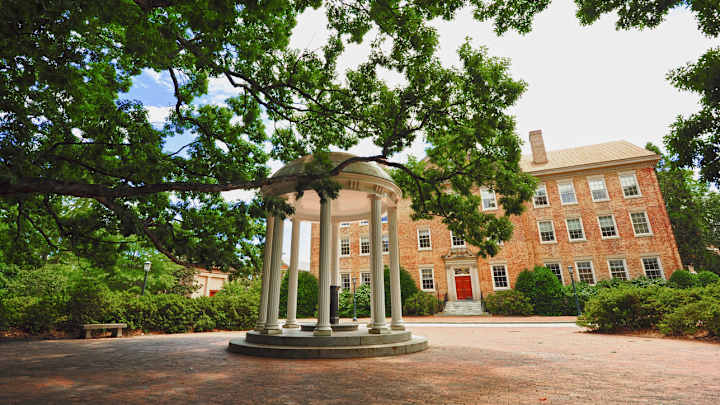Here's What's on the Line at UNC's Committee on Infractions Hearing

The University of North Carolina will meet with the NCAA Committee on Infractions in Nashville, Tenn., on Wednesday to discuss a previous NCAA investigation and three Notices of Allegations (NOAs) against the university.
UNC is facing five top–level charges for allegedly administering irregular courses that allowed students to get high grades in bogus classes. The hearing will determine what penalties and sanctions the university may face.
University chancellor Carol Folt and athletic director Bubba Cunningham will be present. The NCAA requested that men's basketball coach Roy Williams, football coach Larry Fedora and women's basketball coach Sylvia Hatchell attend the hearings. Williams has previously asserted that he knows the university did nothing wrong.
The hearings are expected to run through Thursday, when UNC may have an idea of potential sanctions. A final ruling will be made by the committee at another time.
Louisville's sanctions bear close scrutiny at Ole Miss, North Carolina
What is the scandal?
The NCAA has alleged that UNC used a fake African Studies course to help keep at-risk student-athletes academically eligible for the football and basketball seasons. Athletes in other sports have also been tied to the African Studies courses. This academic scandal spanned more than two decades and allegedly involved 3,100 students. It is estimated that 47 percent of those students were athletes, with 50 percent of those athletes being football players, 12 percent men's basketball players, 6 percent women's basketball players and the rest spread across other sports.
Deborah Crowder, a clerical employee in the Department of African and Afro-American Studies, allegedly registered students in these courses and would distribute grades that would help the athletes meet minimum GPA requirements. The "paper classes" never met and only required students to turn in a final paper. Crowder left the university in 2009 but former department chairman Julius Nyang'oro continued the "shadow curriculum."
The fake classes were discovered by rival N.C. State fans who noted a former football player's paper for a Swahili Class was plagiarized. Nyang'oro was his professor for the class.
The university started looking into the matter when an incoming freshman received a high grade in an upper-level class, as reported by the News & Observer.
To avoid prosecution, Nyang'oro and Crowder cooperated with a new investigation by former U.S. Justice Department official Kenneth Wainstein. The NCAA opened a new investigation in 2014 and then charged UNC in May 2015. The school delayed the process for a bit when additional information was presented for the NCAA to review. In April 2016, the NCAA sent UNC a second Notice of Allegations. UNC responded by saying its accreditation agency could sufficiently handle the issue. The NCAA sent a third NOA in December and included an improper benefits charge that had not been part of the second version. The charges are focused on Nyang'oro and Crowder.
It is up to the NCAA Committee of Infractions to determine whether the evidence shows that the university tried to steer athletes into taking these classes to raise GPAs.
How might North Carolina be punished?
A number of Tar Heel teams could be punished for the scandal, and it remains distinctly possible that North Carolina may have to vacate wins. The committee will discuss penalties when it meets.
In one of UNC's responses to the NOA, the university argues that it would be tough for the committee to be impartial due to the public nature of the scandal over the past six years.
UNC has not self-imposed any sanctions. If the school disagrees with the committee's penalties, it could appeal, which would further delay the process.

An avid runner, Chris Chavez covers track and field, marathons and the Olympics for Sports Illustrated.